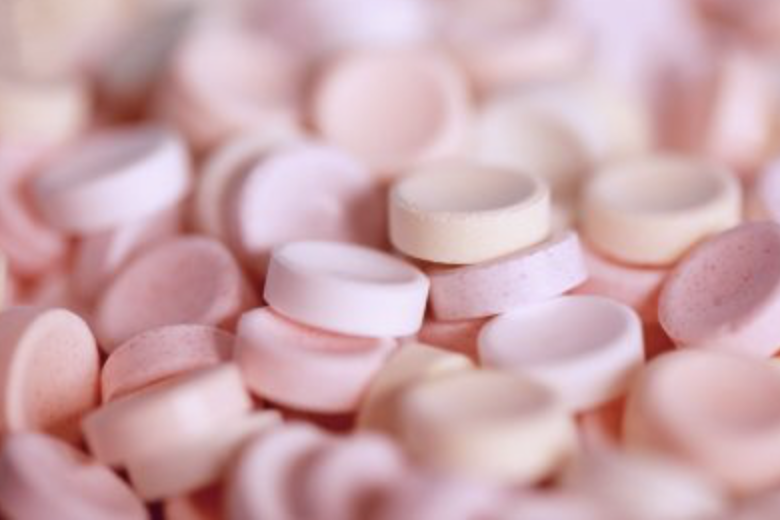Anti-depressants can be amazing. For some, they conceal the symptoms of depression and other mental illnesses for long enough so that we can navigate day-to-day life and cope. They can stabilise your mood for long enough that factors like suicidal feelings and dark thoughts are kept at bay.
For others, anti-depressants are the difference between life and death. Antidepressants work by balancing chemicals called neurotransmitters in your brain, which affect your mood and emotions. Though they are often summed up on health sites in a very basic, ‘one size fits all’ way, the experience of taking anti-depressants is very individual.
They can help you sleep better, and increase your appetite and concentration, but they also have some hefty side effects like feeling lethargic, inducing a lot of yawns, and making you feel like you never want to have sex ever again.
Low libido is one of the most commonly reported effects of taking anti-depressants, and yet it’s the one we’re most unlikely to speak about openly. People will honestly admit to having not slept or eaten properly for a few weeks as ‘it’s a given’, but somehow, admitting you’ve not had sex or not wanted to for a long time makes us feel like failed human beings.
Be kind to yourself
Hold your hand in your other hand. Now you’re holding your own hand. You don’t have to actually do this but we’re not often gentle with ourselves and this is a nice romantic gesture for the self. Looking in the mirror also helps for this next bit. Tell yourself ‘this is fine’, not in the meme way with the dog and all the fire. It’s genuinely, truly, okay. Sometimes we don’t want to have sex and that’s completely okay.
We’ve grown up, as a society, allowing sex to hold too much importance in our lives. Positive sexual relationships are beautiful, human experiences, but we’ve been misled to believe it’s a huge inevitability in our lives, a ‘be all or end all’.
Sex is something we anticipate anxiously when we’re teenagers, wear as a badge of honour when we first experience it, and fear for our lives when problems arise with it as adults. In reality, sex is much more complex than we’ve been allowed to believe. Libidos fluctuate, tastes change, our bodies and brains change and have a direct effect on our sexual experiences.
So you don’t want to have sex? Don’t worry. Everyone goes through this at some point in their lives and it won’t be forever. There’s nothing wrong with you. You’re not broken or defective. You’re just a complex human being who sometimes needs a bit of care and attention in this area. In the midst of over staged social media posts and conversations with friends imitating a highlight reel, it’s easy to think everyone else is having great sex all the time and never having issues, but it’s not true. You’re not alone, and this is normal.
Masturbate
If having sex with someone else is overwhelming, unappealing, or any other strand of difficult, have sex with yourself for the time being. Masturbation is an important act of self-care, an anti-depressant in its own right (though do not replace medication with it without a doctor’s approval) and an important act of self-care. In the curious case of low sex drive, masturbation is your detective work. You need to figure out what new limits your body has, how long things take, and what extra measures you need to enjoy sex and be fulfilled.
Talk to your partner, and then your doctor
It’s hard to do, but it’s important, to be honest with your sexual partners. If you’re in a relationship, your low libido is going to be an effect on them too, something that they will need to adjust to. Talk to your partner about what a low libido means for you. Tell them about the problem as specifically as you can, not because you owe them an excuse for lack of sexual enthusiasm, but because specific, detailed communications save us from a lot of problems in the bedroom.
In my opinion, you should also be honest with casual sexual partners about your feelings and how your libido is too. This is to protect yourself. Casual partners set expectations of sex all the time so that boundaries and feelings towards certain acts are clear. Why shouldn’t your low sex drive be a part of that? This doesn’t mean you have to pour out your feelings to a one-night stand whose name you’re already forgetting. But if you’re arranging a casual sex date with a friend or someone of Tinder, for instance, it’s good to offer a heads up that while you’re into it now, you’ve been struggling with a low libido lately.
Now that you’ve let the person you usually have sex with or the people you’d like to have sex with know that you’re experiencing some struggles, it’s time to chat with your doctor. A lot of people find speaking to a doctor about this problem unnerving, but that’s only because society has tried to prohibit us from talking about sex for a long time. Talking about sex makes us all more understanding about sex and therefore, safer. And who is the best person to talk to about sex? The person who spend 30,000 pounds going to nine years of medical school. That person knows what they’re talking about. And who is the best person to talk to about medication? The doctor who originally prescribed them to you.
It’s not superficial for you to be upset about this. Sex is an important part of most people’s lives. Adjusting your dose or trying a different form of medication might help matters, but you must talk to your doctor first. Don’t come off medication cold turkey in the name of a good shag – that won’t be worth it.
When doing the above, be as specific as you can
If you can, be specific about the problem. Is it erectile dysfunction or vaginal dryness? Are you struggling to maintain interest even though you started sex feeling ready to go? Or has your drive simply disappeared without a trace and you’re unsure why? Whatever it is, identifying the problem gives you power by owning it. Now that you understand the problem, you can effectively apply solutions.
Try something different
This might be your doctor’s or your partners’ advice and it’s certainly my suggestion. It can hurt to admit this to ourselves but it’s an important step of acceptance: when you’re taking anti-depressants, your sex drive is just not the same anymore. The part of your brain that stimulates libido and orgasm is working on different wiring as the medication is manipulating your neurotransmitters to elevate your mood.
For this reason, following the bedroom process that used satisfy you before you started taking anti-depressants probably won’t work. This isn’t a time to dismiss anti-depressants or feel hopeless. This is a time to figure out who you are and what you enjoy while taking your medication. Reframe this difficult period in your sex life as an excuse to ‘up the ante’. Get a vibrator or spank paddle to throw into the mix. Try a new position, create a new sex playlist with your partner. If sex needs to be avoided for a while, try other forms of intimacy. Sit closer together when you watch a film, cuddle, hold each other, try make-out sessions. Trying new things is the perfect way to discover what sexually satisfies you, and it’s a lot of fun!
Repeat the first step again.
Repeat the first step whenever you need to hear that you’re not broken. This is not your fault and it’s not permanent. You’re going to be okay.









